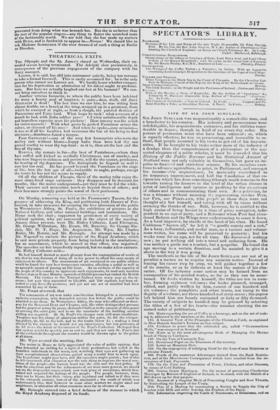On Monday, a meeting was held at the Freemason's Tavern,
for the purpose of addressing the King, and petitioning both Houses of Par- liament, to take measures for securing the free admission of the public to Westminster Abbey, St. Paul's, the exhibition of pictures in the National Gallery, and other national buildings and institutions. Mr. Hume took the chair ; supported by gentlemen of every variety of political opinion, who yet concurred in the object of the meeting. Among those present, were Mr. Ridley Colborne, Lord Ebrington, Mr. George Wilbraham, Mr. Escort, Dr. Bowring, Sir George Sin- clair, Mr. II. T. Hope, Mr. Angerstein, Mr. Wyse, Mr. Charles Buller, Mr. Rennie, and Mr. Reinagle. An attempt was made by a Mr. 1Vagstuff to exclude the pictures of the Royal Academy, which he said were private property, from being included in the resolutions ; but an amendment, which he moved to that effect, was negatived. The speeches are but imperfectly reported, but we make a few extracts. Mr. Ridley Colborne said— He had himself derived so much pleasure from the contemplation of works of art, that he was desirous of doing all in his power to afford the same means of enjoyment to others. The monuments of art contained in our public edifices would be found the very best temperance societies, affording a useful as well as an agreeable means of passing an idle hour. As an evidence of the capacity of the people of this country to appreciate such enjoyments, he need only mention the fact, that on Enter Monday upwards of 23,000 persons had visited the British Museum. The visiters to the National Gallery were every year 011 the in- crease; last year they amounted to 125,000, and 700 students had been ad- mitted to copy from the pictures; and yet not one act of mischief had been committed by any of them.
Mr. Ewart observed, that
The monuments of art now under consideration belonged to a reverend but exclusive corporation, who demanded certain fees before the public could be admitted to see them. In Westminster Abbey, the mail who officiated as show- man for the Reverend Dean awl Chapter, and, like other distinguished persous, had the power of acting by proxy, demanded bullion to the amount of threepence on entering the outer gate, and to see the remainder of the building another shilling was required. At St. Paul's the charges were still more exorbitant. Twopence was the charge of admission within the gates, Is. M. the whisper- ing gallery, 2s. 6d. to the ball, and to the tombs below Is. ; making a total
claimed by the clerical, he would oat say exult tioners but tax.gatherers, of 5s. 24. to see the whole of the interior of St. Paul's Cdhedral. lie hoped that
this system would he speedily put an end to, and that not only St. Paul's, but all the cathedrals throughout the country would be thrown open to the public St all times.
Mr. Wyse assured the meeting, that
The artists in Rome so fully appreeiaud the value of public opinion, that they demanded no shilling for a sight of their productions, but called in the humblest individuals in the town, and, watching their eyes and gathering up their unsophisticated observations' gained many a useful hint to work upon. The Legislature might muss laws, arid the executive might punish ; but of this he felt convinced, that education was the only thing to improve the moral con- dition of the people—the human heart was the only and the best police. If taste for education and for the refinemeuts of art were more general, we should not see the &graceful scenes which now took place at executions, which bra. Sauced and impaired the feelings of the people. The people, however, then, rexe not to blame, but their rulers, who legislated and talked as if they were in the sixteenth century, instead of the nineteenth ; the result of which was unfortunately this, that however in some other matters we might excel our neighbours, in education all other countries were far in advance ot us.
Mr. Reims& entered into a brief defence of the mariner in which the Royal Academy disposed of its funds.


























 Previous page
Previous page